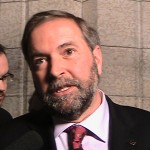Election rhetoric and tiny commitments predominate, slashing and burning may await in omnibus bills.
by John Baglow
OTTAWA , March 19, 2013 (Straight Goods News) — The word "poverty" appears only once in the 442-page document that is the Harper government's new budget plan-and the reference is to poverty abroad. It is packed with self-congratulatory comments about the Harper government's record but vague about the future, other than its numerous references to "keeping taxes low" and its promise of a balanced budget by 2015. By no coincidence whatsoever, that's our next federal election year.
Indeed, this was more a lengthy pre-election statement than anything else. There is no slashing and burning, as Finance Minister Jim Flaherty put it, but there is a maddening lack of detail on every front. Chris Aylward, National Vice-President of the Public Service Alliance of Canada, notes, for example, the promise to pursue aggressive tax avoidance. He wonders what resources will be allocated to do this when the Canada Revenue Agency has just slashed 1,000 jobs.
"More questions than answers," says Robyn Benson, PSAC National President. Claude Poirier, president of the Canadian Association of Professional Employees, makes a similar observation: the budget is "full of words, with a lack of meaning."
PSAC President Robyn Benson says the Budget leaves many questions unanswered.

My own conversation during the budget lock-up with a member of the Treasury Board Secretariat was symptomatic of the difficulty so many of us were having. I tried to get some specifics about proposed changes to the Public Service labour relations regime. It was like talking to a wall-or, rather, it was like listening to the wall itself spout platitudes and vague bromides while refusing access to any doors or windows. The man must have practised his talking points for days. It was all "taking a look at the practices in other jurisdictions," and "consulting with the bargaining agents," and "improvements." In vain I asked for details-for example, the implication in the budget of structural changes in the labour relations process. Nothing doing. A tight smile and more empty general statements.
Finally, pressed for examples, he mentioned sick leave-safe enough, given its prominence in the media over the past few days. There would be more "consultation," more efficiency, more effort in getting people back to work.
He looked pleased with himself, like a schoolchild who has just successfully completed a recitation. I wandered off into the fog.
There is the usual saupoudrage in the budget, money tossed hither and yon to develop an "entrepreneurial culture." Several measures are targeted at First Nations and Inuit, but on closer inspection, the specific amounts are picayune–$10 million over two years to support post-secondary education for First Nations and Inuit youth, $4 million over two years for on-reserve mental health services. And they've got a workfare program for young Aboriginals, too: if reserves don't enforce that, there will be no money for jobs or infrastructure. Meanwhile the government continues its battle to retain the billions of dollars it has been withholding from on-reserve children.
Other than the relentlessly upbeat tone, there is an over-all lack of focus in the budget. What are we supposed to make of abolishing tariffs on golf clubs, for example? The emphasis on business, however, is consistent. Everything seems linked to it. The resources of the National Research Council have now been harnessed to the notoriously short-term aims of the private sector. $121 million will be spent over the next two years "to invest in the strategic focus of the National Research Council to help the growth of innovative businesses in Canada."
The NRC, once a world-class theoretical research site, is "currently undergoing a fundamental transformation in how it does business. Work is well underway to position the NRC to provide businesses with technical services, support for applied research and development projects, access to sector-specialized laboratories and testing facilities, and connections to leading applied research organizations around the world."
The lack of a social policy dimension in the budget concerns Dr. Anna Reid, the President of the Canadian Medical Association. While she approves of the measures to address homelessness and mental illness, and build municipal infrastructure, she would have liked to see a wider recognition of the social determinants of health, such as income disparity. Herb John, president of the National Pensioners and Senior Citizens Federation, echoes this concern. There are no measures to protect pensions in case of company bankruptcies, he notes, and he decries the lack of a national pharmacare program. Poverty, he says, remains a huge issue among seniors, who too often have to choose among filling a prescription, paying rent or buying groceries.
For whatever reason, the post-budget gathering in the Railway Committee Room of the House of Commons, packed in past years with various organizational representatives bustling about to meet the media, was sparsely attended this year. Perhaps it has simply become more difficult to formulate detailed and informed responses to the increasingly woolly political documents that federal budgets under the Conservatives have become. Want the deets? You'll just have to wait for another massive omnibus bill, bulldozing its way through the House of Commons. That's how it's done these days.
 John Baglow is a former Executive Vice-President of the Public Service Alliance of Canada. He is currently a writer, researcher and a
John Baglow is a former Executive Vice-President of the Public Service Alliance of Canada. He is currently a writer, researcher and a 



